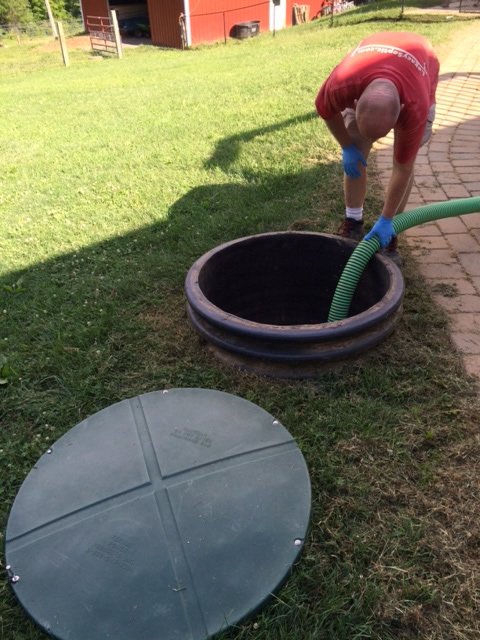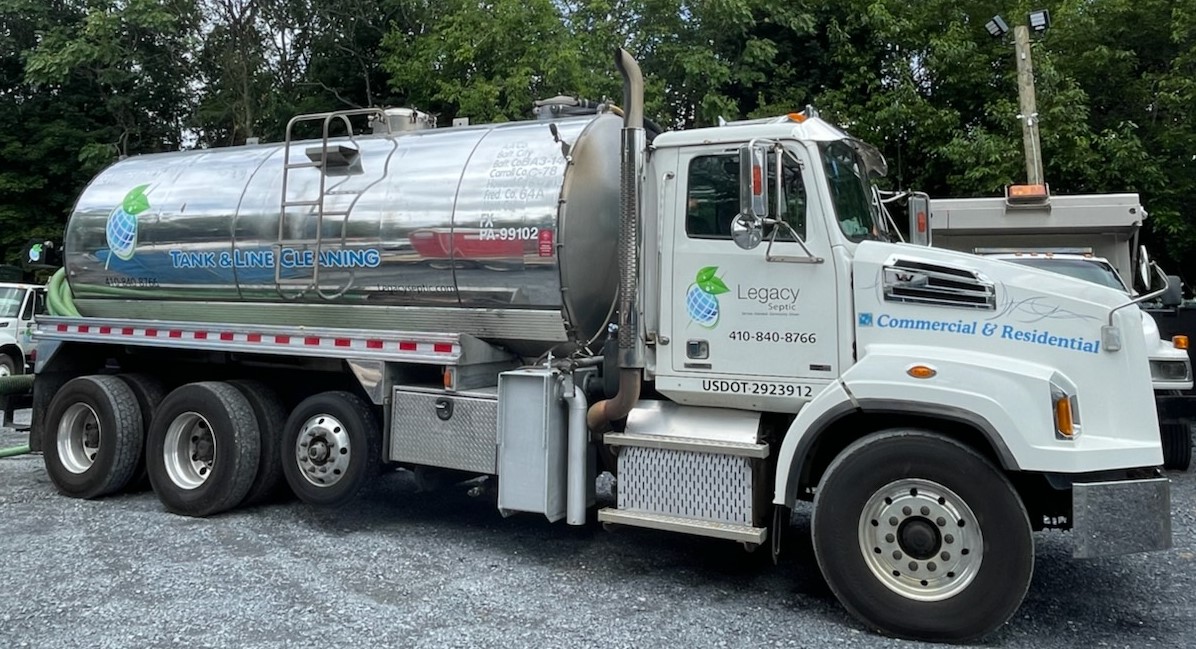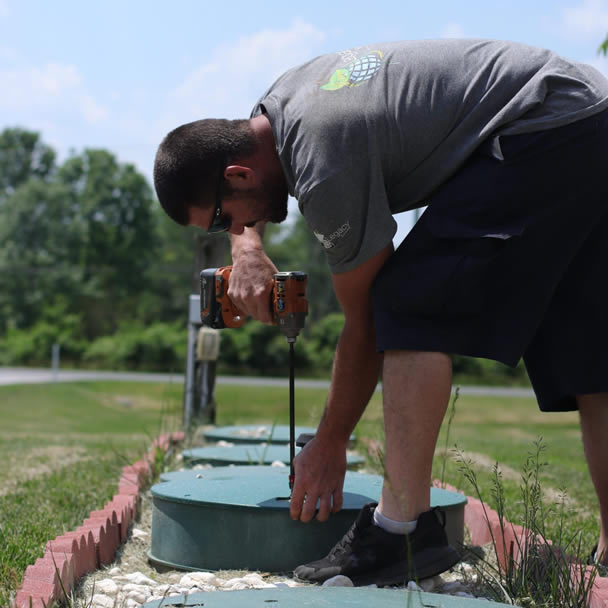Septic Pumping in Parkton, MD
What Residents in Parkton, MD, Can Expect from Legacy Septic Pumping Services
Legacy Septic Services, boasting over 35 years of expertise in the septic industry, is your go-to in Parkton, MD, for all septic-related needs. Our team is certified in BAT septic systems, offering comprehensive services, including installation, pumping, repairs, and the cleaning/unclogging of septic lines.
Upon selecting Legacy Septic Services, we promptly liaise with the local Health Department in Parkton, MD, to obtain records of your property’s septic system. Our technician aims to understand the intricacies of your septic system thoroughly.
On your scheduled service day, we dispatch our skilled technician to perform septic tank pumping. The technician meticulously maps out the septic tank’s location, taking note of any notable conditions such as access challenges or the presence of pets, and determines the necessary amount of hose. Additionally, measurements are taken, and observations are noted, aiding in determining the optimal frequency for your septic tank pumping services.
Our specialist reviews the gathered notes and measurements from your property file, addressing any necessary septic repairs, offering recommendations, and highlighting concerns prior to finalizing your file.
Legacy is also at your service 24/7 for any emergency septic needs. Contact us anytime at 410-840-8766.
Why is it important to get your septic pumped?
Prevents System Failure: Over time, solid waste settles at the bottom of your septic tank, forming a layer of sludge, while lighter waste, such as oils and grease, floats to the top as scum. If not regularly pumped, the tank can fill up with these solids, reducing its efficiency and potentially leading to system failure. This could result in sewage backups into the house or surfacing effluent, both of which are health hazards and expensive to repair.
Maintains System Efficiency: Regular pumping helps maintain the tank’s ability to process household waste. A well-maintained system efficiently separates solids from liquids, allowing clear effluent to safely percolate into the drain field. This process is essential for preventing contamination of groundwater and surrounding soil.
Extends System Lifespan: Septic systems are designed to last many years, but their lifespan can be significantly shortened by neglect. Regular maintenance, including pumping, ensures that all components of the system work effectively, thus prolonging the life of the system and saving money on early replacement costs.
Protects Groundwater and Soil Quality: A properly functioning septic system treats effluent before it reaches the groundwater. Regular pumping is essential to prevent solids from escaping the tank and clogging the drain field, which could lead to untreated sewage contaminating groundwater and soil. Such contamination poses serious health risks to humans and animals and can lead to the spread of disease.
Legal Compliance and Property Value: Many localities have regulations requiring septic tank inspection and pumping every few years. Failing to comply can result in fines and legal issues. Additionally, a well-maintained septic system is an asset when selling a property, as it assures potential buyers that they will not face immediate septic system problems.
The frequency of pumping depends on the size of your tank and the number of people living in your home, but the general recommendation is every 3 to 5 years. However, households with garbage disposals, high water usage, or larger families may need more frequent service. Consulting with a septic system professional can help you establish a maintenance schedule that suits your specific needs.
What is the septic pumping process?
Locating the Septic Tank: The first step is to locate the septic tank. While some homeowners may know where their tank is, others may require the services of a professional. Septic service professionals have tools and methods to quickly locate a tank, even if it’s buried underground without visible markers.
Accessing the Tank: Once located, the next step is to access the tank. This usually involves digging up the soil above the tank’s lids. Modern septic tanks have risers that extend to the ground surface and are capped with lids, making them easily accessible without digging. Older tanks might not have risers, necessitating some digging to uncover the tank’s lid.
Inspecting the Tank: Before pumping, the technician may inspect the tank to assess its liquid and solid waste levels. This inspection helps in determining the condition of the tank and if there are any issues that need addressing, such as leaks or damage to the tank.
Pumping Out the Contents: The core of the process involves pumping out the contents of the septic tank. A large vacuum truck, equipped with a powerful vacuum pump, is used for this purpose. A large hose is inserted into the tank through the access hole, and the pump is turned on. The vacuum action sucks the sludge (solids), scum (fats, oils, and grease), and effluent (liquids) out of the tank and into the truck’s holding tank.
Inspecting and Cleaning: With the tank empty, the technician can now thoroughly inspect the interior of the tank for signs of wear or damage, such as cracks or leaks. Some services also include washing down the walls of the tank to remove any remaining sludge and to inspect the tank’s structure more closely.
Disposing of the Waste: The waste collected from the septic tank is not simply discarded anywhere; it must be disposed of properly at a designated processing facility. These facilities treat or process the waste material in an environmentally safe manner, often turning it into fertilizer or disposing of it according to local regulations.
Closing the Tank: After pumping and any necessary inspections or cleaning, the tank’s lid is securely replaced, and if any digging was done to access the tank, the area is refilled and restored to its original condition as much as possible.
Recommendations and Report: The technician may provide recommendations based on the condition of your septic tank and system, such as repairs or more frequent pumping intervals. A report of what was done and any observations made during the pumping process is usually provided to the homeowner.
Regular septic tank pumping is a critical maintenance task that helps prevent system failures, extends the life of the septic system, and protects the environment and public health. The frequency of pumping depends on several factors, including the size of the tank, the number of people living in the home, and the amount of wastewater generated.
How Often Should I Get My Septic Pumped?
Size of the Septic Tank: Larger tanks can hold more solids before needing to be pumped, while smaller tanks fill up faster.
Number of People in the Household: More people means more wastewater and solids are introduced into the septic system, which can fill the tank more quickly.
Amount of Wastewater Generated: High water usage increases the volume of effluent that passes through the tank, affecting how quickly the solids layer accumulates.
Volume of Solids in Wastewater: The use of garbage disposals, frequent laundry, and other practices can increase the amount of solids entering the tank, potentially requiring more frequent pumping.
Given these factors, a general rule of thumb for septic tank pumping schedules is as follows:
- 1 to 2 people in the household: Every 3-4 years
- 3 to 5 people in the household: Every 2-3 years
- 6 or more people in the household: Annually or every 1-2 years
These are broad guidelines, and your specific situation may vary. For example, if you have a smaller tank and a large family, you might need to pump your tank more frequently than suggested above. Conversely, if only one or two people live in a home with a large tank, you might be able to extend the interval between pumpings.
Another factor to consider is whether your household practices can be adjusted to reduce the strain on your septic system. Using water efficiently, not disposing of non-biodegradable materials in toilets or sinks, and avoiding putting grease or harmful chemicals down drains can help reduce the need for frequent pumping.
It’s also wise to have a professional inspect your septic system periodically. During an inspection, a technician can assess the sludge and scum levels in your tank, check for leaks or damage, and recommend a pumping schedule based on the tank’s current condition and your household’s usage patterns.
Ultimately, staying proactive about maintenance and being mindful of how your household consumes water and disposes of waste can help extend the life of your septic system and prevent costly repairs or replacements.

Request Pumping Service
"*" indicates required fields
Call Us
Text Us
Other Septic Services
Septic Installation
Legacy Septic specializes in professional septic system installations, ensuring that every system is expertly designed and built to meet the specific needs of your property. With meticulous attention to detail, our experienced team employs the latest technologies and follows the highest standards of safety and efficiency. From initial soil testing and system design to the final installation and inspection, Legacy Septic provides a seamless and stress-free experience. Our commitment to excellence and customer satisfaction makes us a trusted partner for homeowners seeking reliable septic solutions. Choose Legacy Septic for an installation process that’s not only thorough but also tailored to ensure the longevity and optimal performance of your septic system.
We can provide a septic tank faster than anyone else. All you wait for are the permits!
Septic Preventive Maintenance
Septic preventive maintenance is crucial for extending the life of your septic system and ensuring it operates efficiently. By engaging in regular maintenance activities, you can avoid common septic system problems and ensure your system remains in good working order.
Here’s what we offer with our septic preventive maintenance:
- Sewer Ejector Pump Preventive Maintenance Program
- Sandmound Preventive Maintenance Program
- BAT (Norweco) Septic Maintenance Program
Water/Sewer Line Repair
Even if your residence is connected to the municipal water and sewer system, you might still encounter the need for repairs to your water and sewer lines. These lines are susceptible to damage from various factors, including cracks, breaks, corrosion, tree root intrusion, freezing temperatures, the natural aging process, and ground settling. Legacy Septic is equipped to offer a comprehensive suite of water and sewer line services, ready to assist promptly to prevent any damage to your home.
About Legacy Septic
Our mission at Legacy is to serve as educators in the septic industry, whether we’re assisting first-time homebuyers, current property owners, or home sellers facing tight closing deadlines. Our goal is to empower young couples with knowledge, helping them avoid unforeseen issues lurking beneath the surface before making a purchase. We aim to provide existing property owners with insights into actions that could enhance their septic system’s efficiency and longevity. For home sellers, particularly those looking towards retirement, we believe it’s crucial to be able to assure prospective buyers of the septic system’s excellent maintenance and condition. We achieve these objectives through community education initiatives and personal on-site visits, always valuing and upholding your trust.




About Parkton, MD
Parkton is an unincorporated area in the northern part of Baltimore County, Maryland. It borders southern York County, Pennsylvania, which forms part of the Mason–Dixon line. The area is mostly agricultural in nature, with corn, soybeans, and other industrial use crops being the major plants grown. It takes its name from Margaret Parke, who divided the land she inherited from her father James Calder, and began selling building lots circa 1854. York Road, one of the first public turnpikes, passes through Parkton, where a tollgate was established in 1859 .
Approximately 6,600 people live within ZIP Code 21120. Parkton is located in the rolling hills of northern Baltimore County, providing residents with beautiful views and a rural feel. The area is known for its picturesque farms, horse farms, and historic homes.
Numerous outdoor recreational opportunities, including Gunpowder Falls State Park, Loch Raven Reservoir, and Prettyboy Reservoir, surround Parkton. These parks and natural areas offer a wide range of activities, such as hiking, fishing, boating, and camping.
Service Oriented. Community Driven.
Proudly serving Carroll, Baltimore, Howard and Frederick Counties, including Owings Mills, Reisterstown, Monkton, and Parkton for over 35 years!
Get Social With Us!
Contact Us!
2914 Hanover Pike
Manchester, MD 21102
Telephone: 410-840-8766
Email: info@legacyseptic.com
Text: 240-372-2744
© 2025. All Rights Reserved. | Privacy Policy




